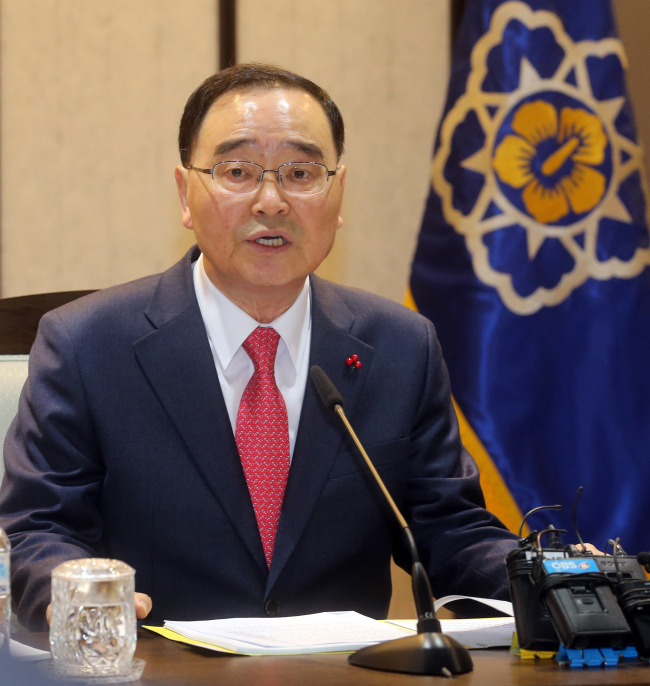
Chung Hong-won
Concerns over a massive reshuffle are spreading among the country’s 1-million-strong civil service following Wednesday’s reshuffle of top officials at the Prime Minister’s Office. Five of the 10 Grade-I civil servants at the PMO who submitted their resignations eight days ago have had to step aside to help accelerate the government’s operations. The remaining five officials were either promoted or transferred to other sectors.
While the move is not unusual in its scale, its timing appears to have taken the civil service by surprise.
According to long-serving government officials, it is customary for “Grade I,” or top-ranked, officials to tender their resignations at the beginning of a new administration. The Park Geun-hye administration, however, did not receive resignations from nor remove high-ranking officials.
In an attempt to stem the spreading rumors that a massive reshuffle across the government is in the works, Prime Minister Chung Hong-won announced on Thursday that the decision was made by his office based on their performances and that it has no implications for other ministries.
The announcement, however, appears to have done little to dampen the rumors.
“The office mood is down. Everyone’s on edge right now,” said a mid-level official at the PMO.
“It will definitely expand to other ministries. This is only the beginning,” said an anonymous public official who has been serving for more than 20 years.
Such speculations were further fueled by Security and Public Administration Minister Yoo Jeong-bok’s earlier comment. On Jan. 2, Yoo, a close confidant of President Park Geun-hye, hinted at an additional reshuffle saying that mass resignations from top-tier officials at other ministries cannot be ruled out.
While civil servants speculate over what will happen to their organizations, experts said that the measure is likely to be the government’s way of bringing the bureaucrats in line.
“This is the government’s way of disciplining the public servants. The administration is attempting to stimulate them to perform better in their job by showing an extreme case,” said Shin Yul, professor of Myongji University.
Unlike most working-level civil servants, the tenure of Grade I positions ― a position equivalent to vice minister ― is not legally guaranteed.
As of last year, out of some 1,500 high-ranking public officials, 288 public servants belonged to the Grade I group. The Ministry of Foreign Affairs has the most with 93 Grade I officials, followed by the Presidential Secretariat and other ministries. The PMO now has only five.
As for the impact the large-scale reshuffle will have on the government operations as a whole, observers are skeptical.
Saying that the move is likely to be a reflection of the president’s impatience with the lack of progress with her agenda, Yonsei University professor Yang Seung-ham said that little will change due to the weakness of the PMO.
“The PMO doesn’t have much influence, its role is mainly managing and moderating so (the reshuffle) will have little significance,” Yang said.
He added the Park Geun-hye government faces sluggish progress due to the lack of new ideas ― which working-level civil servants need to develop ― and because “everyone is just looking to the president” as Park takes the lead on most issues.
“The prime minister himself doesn’t have much power. (The reshuffle) will raise an alarm but at this scale (civil servants) will not be moved.”
By Lee Hyun-jeong
(rene@heraldcorp.com)






![[Weekender] How DDP emerged as an icon of Seoul](http://res.heraldm.com/phpwas/restmb_idxmake.php?idx=645&simg=/content/image/2024/04/25/20240425050915_0.jpg&u=)